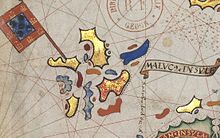
Back Portuqal İndoneziyası Azerbaijani Kekaèsaran Portugis di Nusantara BEW Imperio portugués en el archipiélago indonesio Spanish Imperium Portugal di Nusantara ID Portugueses na Indonésia Portuguese Португальская Ост-Индия Russian Португальська Ост-Індія Ukrainian
| c. 1522–1605 | |||||||
 Map of the Portuguese empire in the East Indies (including the Indonesian Archipelago), Atlas Miller. | |||||||
| Status | Settlement and possessions of the Portuguese Empire | ||||||
| Capital |
| ||||||
| Common languages | Portuguese, Malay, Ternate, Tidore, Other indigenous language. | ||||||
| Government | Monarchy | ||||||
| Monarch | |||||||
• 1522–1557 | John III | ||||||
• 1598–1605 | Philip III | ||||||
| Captain-General | |||||||
• 1522–1525 (first) | Antonio de Brito | ||||||
• 1602–1605 (last) | Pedro Alvares de Abreu | ||||||
| Historical era | Early modern | ||||||
• Established | c. 1522 | ||||||
| 22 April 1529 | |||||||
| 22 February 1605 | |||||||
| |||||||
| Portuguese colonization era | |||
|---|---|---|---|
| 1512–1605 | |||
 Map from 1519 showing the islands of North Maluku, with the Portuguese banner planted. | |||
| Location | Malay Archipelago, East Indies | ||
| Including | Portuguese–Ternate wars | ||
| Leader(s) | Alfonso de Albuquerque António de Abreu Francisco Serrão | ||
| Key events | Age of Discovery | ||
Chronology
| |||
The Portuguese were the first Europeans to establish a colonial presence in the Indonesian Archipelago. Their quest to dominate the source of the spices that sustained the lucrative spice trade in the early 16th century, along with missionary efforts by Catholic orders, saw the establishment of trading posts and forts, and left behind a Portuguese cultural element that remains in modern-day Indonesia.
Cite error: There are <ref group=lower-alpha> tags or {{efn}} templates on this page, but the references will not show without a {{reflist|group=lower-alpha}} template or {{notelist}} template (see the help page).

